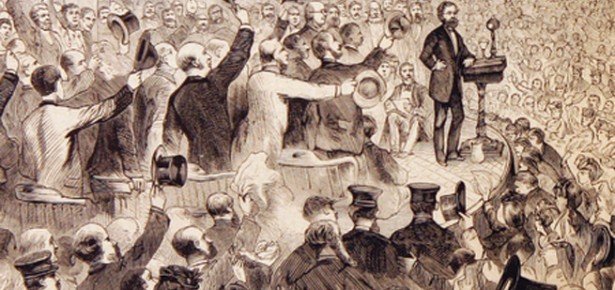
On July 17, 1870, in a move usually deemed irrelevant to the conflict that roiled the United States 150 years ago, France declared war on Prussia. The French cited a diplomatic slight stemming from negotiations over the Spanish throne. But the real reason for the conflagration, as observers immediately understood, was Emperor Napoleon III’s desire to check Prime Minister Otto von Bismarck’s plans for German domination of Europe.
No American agitated behind the scenes, but the work of an influential contingent of German Americans, and the themes of national power and citizenship rights, intertwined the outbreak of war in Europe with developments in North America.
Bismarck’s success in using the Franco-Prussian War to forge an empire was a key point of connection. During the mid-nineteenth century, both Germany and the United States were consolidating imperially minded nation-states. Fighting the Confederacy saved and strengthened the American Union. Defeating France facilitated the rise and unification of the German states under Prussian auspices.
But the transatlantic connections went further. On both continents, marginalized individuals contemplated what the momentous military, political, and economic transformations meant for them. Enslaved African Americans decided that a war for union meant a war against slavery long before white Northerners had come around to the idea. Struggling Europeans similarly hoped that German unity would bring economic justice, common dignity, and political rights for men.
Once, historians would have emphasized the contrast between the governments that emerged from the American Civil War and the Prussian battles with France. Between 1862 and 1870, the Union war effort fused American nationalism to the abolition of slavery and the extension of some citizenship rights to black women and, especially, men. The new German Empire, provocatively proclaimed at Versailles in January 1871, boasted a parliament elected by universal manhood suffrage, but the measure was largely intended to legitimatize a body that would to bypass individual state legislatures. As it was, the Reichstag did little to check Bismarck’s power, especially over the budget and the military. It acquiesced to notorious crackdowns on socialists and Catholics before the decade was out.
Still, Bismarck’s empire was not Hitler’s Reich, and it would be a century before Americans could pretend that the semblance of racial justice embodied in the Civil War amendments was being enforced. Directly following the war, Native Americans faced a period of particularly intense, violent, and coercive conquest. The interconnections between European and North American history were as significant as the contrasts.
Refugees from the failed European Revolutions of 1848 personified the ties between the two continents. The German “Forty-Eighters” had brought a revolutionary energy across the Atlantic. The most successful was Carl Schurz, a student activist who had joined a republican militia and rescued his favorite professor from a Prussian jail before making his way to the United States in 1852. Like many of his counterparts, he joined the radical wing of the Republican Party. By Schurz’s own report, Abraham Lincoln named him “foremost of all” among Republican campaigners in 1860. After the election, the immigrant went on to serve as a brigadier general and senator from Missouri. He was one of the Republicans who made possible the Fifteenth Amendment, which outlawed voting discrimination on the basis of race in 1870.
That summer, Forty-Eighters also directed the attention of Americans to the Franco-Prussian War. German immigrants rallied across the country, and one German-language newspaper in Cincinnati called it the “greatest event of the century.” In fact, English-speaking Americans needed little convincing of the war’s importance. Dramatic news was streaming across the new transatlantic telegraph cable and onto the front pages of their newspapers.
But German Americans were particularly optimistic about the new empire. They were proud of its impressive armies, efficient bureaucracies, and comprehensive education system. To them, the rising Germany, not the “backward” France, had lessons to teach the United States.
The timing was perfect. In 1870, many white Republicans were tiring of enforcing those amendments that had fused American nationalism and individual rights. The wartime energy that African Americans had harnessed was waning. In its place, men such as Schurz were popularizing more bureaucratic definitions of national greatness. Workers, particularly black ones, seemed in need of “civilizing,” and civil service reform promised to reduce their power over government. These were exactly the areas in which Germans claimed preeminence.
Support for bureaucracy and hierarchy did not suddenly materialize after 1870, just as demands for racial justice and individual rights did not evaporate. As Americans digested the European war, however, they felt the passing of a brief era when black rights had been the prevailing means of nation building. White Americans rejected this alternative, joining other Europeans in following a more institutional and imperial path to power.
Latest Comments
Have your say!